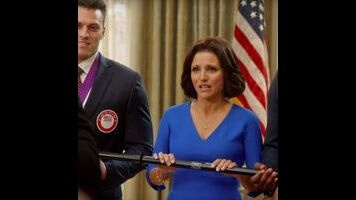Veep is as commanding as ever in its excellent fifth season

“A rising tide lifts all boats,” goes the idiom popularized, though not coined, by John F. Kennedy. By that logic, the current presidential cycle has been like a supermoon for political satires, a race so surreal and rancorous as to make greying comedy writers regret their retirements. It must be a bittersweet moment for Armando Iannucci, creator of HBO’s Veep, who stepped down as showrunner after the triumphant fourth season. Iannucci is still credited as a consultant, but during this especially fertile political era, responsibility for the downturns and sick burns has fallen to Veep’s new showrunner, Curb Your Enthusiasm alum David Mandel.
The changing of the guard leaves Veep in a precarious position, perhaps for the first time in its history, because the “showrunner leaves and show goes to shit” narrative has become so deeply ingrained in the public’s understanding of how television storytelling works. And given Iannucci’s singular, outsider voice and the crystalline vision for his funhouse-mirror reflection of American politics, he seems like an especially tough act to follow. But the fifth season of Veep doesn’t just win the expectations game, it just wins. The rapid-fire, acid-tongued dialogue hasn’t changed, nor has the almost unfathomable ratio of zingers per minute. With a cast this talented—Julia Louis-Dreyfus remains at the height of her talents—the only thing that could go wrong is the writing, but it’s as assured and hilarious as ever.
Despite the showrunner switch, the only uncertainty takes place in front of the camera, where President Selina Meyer (Louis-Dreyfus) navigates the aftermath of a razor-close election that left the nation uncertain of who its next leader will be. Naturally, Selina isn’t as much concerned about the effect this will have on her ability to govern as much as she is worried about losing the power of the presidency and all the perks that come with it. Meanwhile, her team of foul-mouthed aides buzzes about as usual, so deep into their A-type routines that they’ve lost any emotional connection to why they’re doing what they’re doing. In fact, Selina’s former campaign manager Amy Brookheimer (Anna Chlumsky) spends most of the season premiere trying to figure out whether she still actually works for the sitting president. Amy’s still in the mix following her explosive exit last season, and her relationship with the president has taken on the dynamic of a friends-with-benefits arrangement—she doesn’t want to commit, but the good parts are too good to relinquish.
In other words, it’s business as usual around the Meyer White House, with Selina’s underlings jockeying for position. Her reluctant, scheming vice president Tom James (Hugh Laurie) is still doing his damnedest to quietly undermine her leadership, and the relationship between that has reached new levels of hostility. But there are more noticeable shifts in the storytelling even as Veep stays remarkably consistent with its earlier seasons. Unlike the typical comedy of errors, which protects its dunderheaded status quo at all costs, Veep delights in allowing its characters to display flashes of ingenuity and mettle. Last season’s effusive low-man Richard Splett (the indispensable Sam Richardson) is suddenly at the top of his game, thrust into the spotlight thanks to his granular knowledge of recount law.
Selina also gets a new love interest played by John Slattery, a suave plutocrat whose romantic relationship with Selina is complicated by his proximity to her rival in the presidential race, Senator Bill O’Brien (Brad Leland). Clea Duvall also joins the cast as the new head of Selina’s security detail, a job she won based on her resemblance to Selina from behind. Veep excels when it’s mocking Selina’s boundless vanity, and between a high-profile romance, a dubious body double, and a massive blemish on her face, there’s plenty of opportunities for her to go to hilarious means trying to keep up appearances. The fourth episode, which features a development too interesting to spoil, is Veep’s biggest challenge yet to Selina’s ability to demonstrate grace under fire, and Louis-Dreyfus’ brilliance could earn her yet another Emmy.
The season isn’t completely perfect, based on the four episodes screened for critics. A new character, one of Amy’s relatives, could use some calibration. And when the battle for the White House leads to a vote-by-vote recount, Veep shares more in common with the Florida debacle in 2000 than with the far more scandalous developments in the current race. (Donald Trump is honored with some oblique references, but his rhetoric is too extreme even for a show in which the president wants to her vice president to fuck a bag of glass.) But it’s as difficult as ever to find reasons to quibble with Veep. Under Mandel’s steady guidance, the show has pulled off a feat its bumbling characters couldn’t possibly accomplish: a seamless transfer of power between administrations.